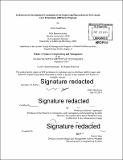An enterprise architecture evaluation of the Improving Massachusetts Post-Acute Care Transitions (IMPACT) Program
Author(s)
Nambisan, Rohit
DownloadFull printable version (10.71Mb)
Other Contributors
Massachusetts Institute of Technology. Engineering Systems Division.
Advisor
Deborah Nightingale.
Terms of use
Metadata
Show full item recordAbstract
The Post-Acute Care Transfer process is a critical area affecting the quality and safety of patient health care in the US'. While many Post-Acute Care (PAC) centers are Electronic Health Record (EHR) -enabled, a large majority of these centers, such as nursing home and home care, are not set up for exchange of electronic health information. Regardless of EHR capabilities, there are currently no standards for health information transfer between PAC sites. The lack of standard and effective processes to collect and transfer critical patient health information during PAC transitions may be a critical component leading to issues with patient safety and quality during PAC Transitions. Additionally, issues resulting from Post- Acute care transitions (PAC transitions) are implicated as critical drivers for health care utilization in the US (2012 Medicare Chart Book). Funded by an Office of the National Coordinator Health Information Exchange challenge grant, Improving Massachusetts Post-Acute Care Transfers (IMPACT) is an innovative project managed by the Massachusetts eHealth Institute (MeHI) that will improve care transitions to and from post-acute care organizations in Massachusetts through the automation of a new Universal Transfer Form UTF for PAC transitions. Additional technical work includes creation of the Local Area Network Device (LAND) & Surrogate Electronic Environment (SEE) platforms, which together allow long-term care providers to send and receive patient information electronically through the Massachusetts HIway. MeHI is a SDE and recipient of American Recovery and Reinvestment Act (ARRA)/Health Information Technology for Economic and Clinical Health (HITECH) federal funds to create an HIE infrastructure in Massachusetts. MeHI seeks a thorough program evaluation of the IMPACT program. Due to the complex organizational, political, and technological architecture associated with the Post-Acute Care transitions and the interface between LAND & SEE and the HIway, a systems perspective is needed to accurately evaluate and provide recommendations to meet the needs of the program. The following describes the current state assessment for both 2012 and 2013 IMPACT program following the Enterprise Strategic Analysis for Transformation (ESAT) and Enterprise Architecting (EA) methodologies developed out of MIT's Sociotechnical Systems Research Center. Additionally, consideration is given to a future state assessment, which is the ideal set of future state goal derived through a visioning workshop with key stakeholders.
Description
Thesis: S.M. in Engineering and Management, Massachusetts Institute of Technology, School of Engineering, System Design and Management Program, Engineering and Management Program, 2014. Cataloged from PDF version of thesis. Includes bibliographical references (page 87).
Date issued
2014Department
Massachusetts Institute of Technology. Engineering and Management Program; System Design and Management Program.Publisher
Massachusetts Institute of Technology
Keywords
Engineering and Management Program., System Design and Management Program., Engineering Systems Division.